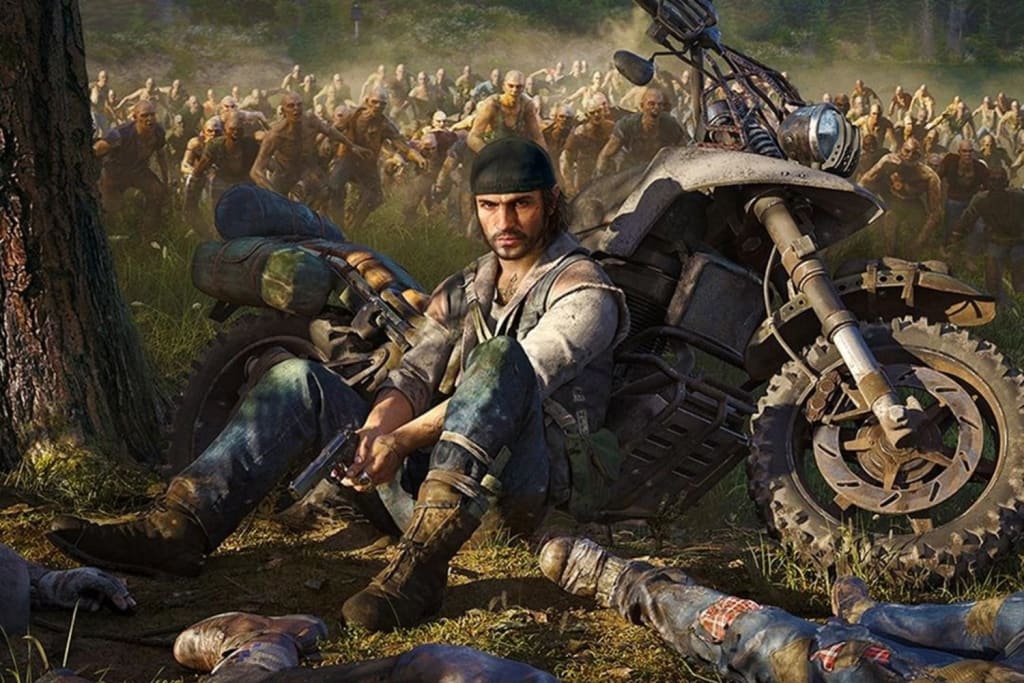Days Gone and a real pandemic
2019's Days Gone has important lessons about weathering a real pandemic today

This article contains spoilers for the PC/PlayStation 4 video game Days Gone.
Days Gone was released about a year before the pandemic struck. At that time, the game didn’t do well with critics, and players complained that its open world was boring and depressing. Yet, after the pandemic, it seems that like other post-apocalyptic video games, Days Gone found new footing. Days Gone tells the story of Deacon St. John, a rough and tumble member of the Mongols biker gang. When a pandemic suddenly strikes the majority of the population are turned into freakers. Freakers aren’t exactly zombies, and they're not exactly vampires either. The virus that ravages the world in Days Gone genetically alters people’s bodies, making them faster and stronger, with a desire to feast on anything, literally. Like Covid, the virus that causes the freakers affects everyone differently. Some people recover, and avoid becoming a freaker, while others (based on age) simply die.
The world of Days Gone is grim, and those that survived are often the worst that society has to offer. Throughout much of the game, characters debate who is worse, survivors or freakers. The story centers on Deacon’s search for his wife. They were separated when the outbreak began, and he’s spent the past two years riding the open road, looking for hope that somewhere she might be alive. Days Gone inadvertently tapped into something we’ve watched happen during the Covid pandemic. When Deacon finally finds his wife Sarah, she’s not the Sarah he remembers. In the game, just like in the real world, trauma changes people. The sweet and caring woman he remembered is hard, callous even. To his shock she’s fallen in with a militia hell-bent on waging war against the freakers, and anyone else who disagrees with them.
Trauma changes people, and for over a year, all around us we have seen trauma. We’ve watched people we know needlessly die at the hands of a preventable virus. We watched the riots explode after the death of George Floyd and just last year we watched a group of vagrants infiltrate our nation’s capital, seemingly poised to hang the American vice-president. And the trauma hasn’t stopped. Today, we have a surge of the Delta Covid variant. Despite statistics far more dismal than any other point in the pandemic, nothing is being done. Federal government has taken a stance that vaccination will end the onslaught, but state and local governments seem apathetic or uncaring about the human cost of this virus.
Enhanced unemployment benefits, stimulus checks, eviction moratoriums, all these things helped keep the trauma from spilling over into actual resentment, anger, and inevitably violence. People felt secure that at the very least, the global pandemic wouldn’t sink them, they wouldn’t lose everything. But then, the pandemic didn’t end. It got worse. Suddenly, despite the viral surge, people were expected back to work where exposure to the deadly virus was imminent. No more checks, no more unemployment, the social safety net was folded up and packed away. This was after the public watched wealthy businesses get handed millions in PPA loans, and after watching corporations make record profits and real estate values soar. The anger, perhaps damned up by the economic measures, was suddenly flowing out all around us.
And, as a result, we changed. The anger and resentment that permeates society right now is palpable. You can see it on social media, and feel it whenever you’re somewhere that people congregate. Anger at the unvaccinated. Anger at the vaccinated. Anger at doctors. Anger at everyone. We’ve changed, and like in Days Gone, there really is no going back. Many romantic couples separated during the pandemic. Teen suicides, and suicides in general went through the roof. Why? Romantic couples likely separated because the people within those relationships changed. On top of the added pressure and trauma of life in the 21st century, the pressure and trauma of a pandemic turned them into someone else. In the story of Days Gone, the lead character is a former member of the 10th Mountain Division, a veteran of the Afghan war. He had lived through the horrors of war, and was specially trained to deal with a non-stop assault of violence and despair. When he finally finds his wife after two years, he is much the same person he was before. A tough outlaw biker, a product of the best military on the planet. Yet, his wife, she is someone else, someone new. There is a look of both shock and horror on his face the first time he watches his wife blow someone’s head off. This isn’t the woman he married.
The characters in Days Gone never defeat the pandemic. They learn to live with it, and they learn that the pandemic has given them all a new sense of purpose. The most powerful lesson this video-game about a pandemic can teach us is that the only way to overcome the trauma of a global pandemic is to work together. Nearing the end of Days Gone there is a scene where multiple camps, who just weeks before were at each other's throats, come together to take down a massive militia that intends to subjugate the entire population of survivors. Together, they overcome stark odds, and in doing so remind themselves why divided we fail. Sure, the world isn’t what it once was, it’s something new, but if we tackle these challenges together, we will most assuredly overcome them.
Imagine if we applied this ideal to tackling the real Covid pandemic. Imagine if we could all just agree on the right course of action. Perhaps 95 percent or more of Americans would be vaccinated. Perhaps businesses would restructure themselves to provide the same products and services, just safely. Perhaps we would finally agree that it’s best that anyone working 40 hours a week not live in poverty. Maybe even we could all agree that healthcare is a human right, not a for profit industry that enriches a few at the top. Maybe we could agree that endless wars of attrition aren’t in anyone’s best interest.
If we could just agree on a course of action, and then commit ourselves to it together, we might just be able to leave the old world behind and build a better, new world that doesn’t take the health, safety, and dignity of others for granted. Here where I live, the Covid pandemic is at a new high. Positivity rate and overall cases are at a maximum. Entire doctor’s offices are closed because their entire staff has Covid, and local hospitals are no longer accepting new patients. Businesses and local leadership continue to do nothing, ignoring the surge while advertising fall sales and upcoming festivals. Schools are trying to stay open with duct tape and glue. Local employers are afraid of vaccine mandates because they fear their workforce will quit, yet they refuse to offer a living wage or healthcare benefits. Like in Days Gone, it’s not actually the virus that’s scary, it’s the greed, indifference, and outright indecency of our fellow man.






Comments
There are no comments for this story
Be the first to respond and start the conversation.